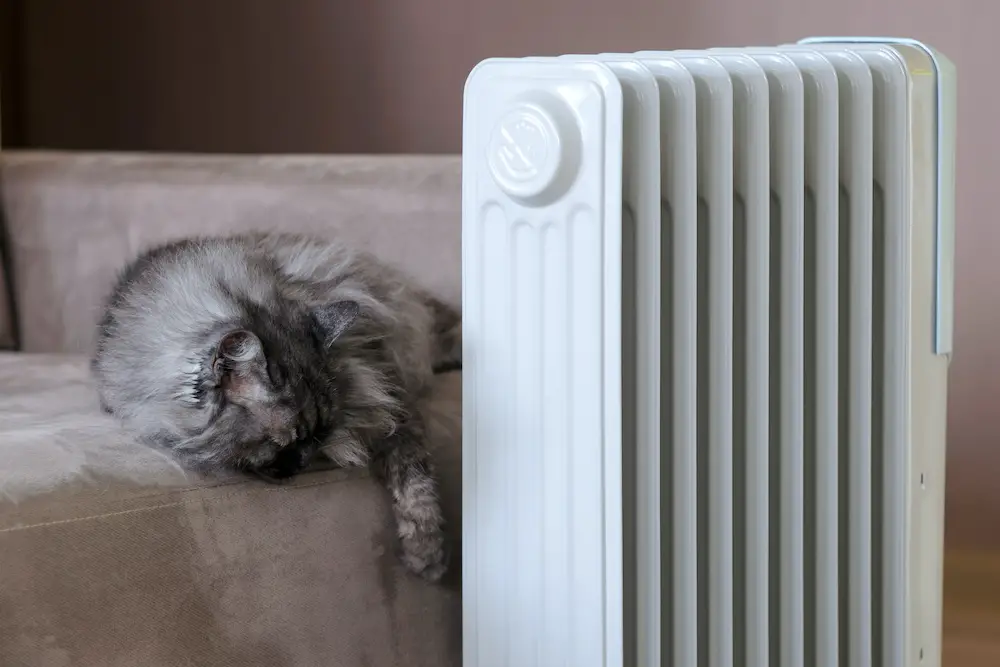It can be hard to determine which is the best heating system since there are so many different ways to heat your home.
When it comes down to it, each type of heater can be better at warming different spaces.
For instance, electric space heaters are best for small rooms, while oil heaters are more suited for larger ones.
Plus, electric heaters can produce a humming sound, while oil heaters are typically quieter. In this article we will compare what heater is best: oil heater vs electric heaters?
- What Are Oil Filled Heaters?
- What Are Electric Heaters?
- Are Oil Heaters Cheaper to Run Than Electric Bar Heaters?
- Which Type of Heater Is Cheapest To Run?
- Do Oil Heaters Use a Lot of Electricity?
- Do Heaters Impact the Environment?
- Which Has More Design Options?
- Oil Heaters vs Electric Heaters in Different Situations
- Oil Heater vs Electric Heaters: The Conclusion
What Are Oil Filled Heaters?
Oil heaters work by using electricity to heat thermal oil inside of the unit.
An electrical element is covered by oil, allowing it to transfer the heat to the surrounding liquid.
Once the liquid has warmed, the unit will start heating your room.
When it comes to an oil filled radiator vs an electric heater, the oil in the unit gives it more advantages.
This heating process is a lot different than conventional space heaters.
Pros
The most notable benefits of oil heaters are:
- Energy Efficient
Once they reach your desired temperature, the oil can retain heat for longer. This process also uses lower levels of power, saving you money.
- Quiet Operation
Heating with oil makes no sound, which is excellent if fan noises or humming bothers you.
- Provide Lasting Heat
Oil retains heat and stays hot for many hours even after the unit has shut down.
- Less of a Fire Hazard
Oil heaters usually have more accurate thermostats than electric heaters.
Cons:
The common problems with oil heaters include:
- Heavier and Bulkier
To accommodate the whole system and oil, these heaters have bulkier designs.
Also, the product’s weight is can be heavy because of the oil, making it hard to move around.
- Slower To Heat
The oil inside needs to heat up before it produces heat, which usually takes longer compared to electric element heaters.
They usually take half an hour to make a temperature difference.
What Are Electric Heaters?
Electric heaters use a heating element that becomes warm when energy passes through it.
It can be metal or ceramic and transfer heat into the air by convection or a fan.
Pros
Some of the best things about electric heaters are:
- Heat Up Faster
Once you plug in an electric heater and the heating element receives power, it will produce heat very quickly.
- More Safety Features
Most do not have hot external surfaces and have automatic turn-off systems that shut the product when knocked over.
Cons
Some of the things to keep in mind when considering an electric heater include:
- Not Good for Allergies
The heater fan can stir up dust and other allergens. So, if you have a pet at home, using a high-quality pet vacuum can make a world of difference when you plug in your heater.
- Noisy
Most of the noise coming from an electric heater is due to the fan.
- Inaccurate Thermostat
The thermostat in your electric heater can be affected by several factors such as nearby heat sources and direct sunlight.
- Quicker Heat Loss
When you turn the heater off, the heat starts to drop right away.
Are Oil Heaters Cheaper to Run Than Electric Bar Heaters?
Oil heaters are cheaper to run than an electric bar heaters, although they tend to cost more upfront.
Oil heaters have a higher heat retention capability. This feature means that they stay hot for longer even when they are shut off.
As such, they can still warm a room without using any power at all.
An oil radiator does take longer to heat up compared to an electric bar heater.
Still, some models have a “low” or ECO setting to keep power usage down.
Electric space heaters have no heat retention, so as soon as you turn it off, the room will start to cool back down.
Not being able to hold heat also means that you will probably have to run it on a “high” setting most of the time too.
So, when comparing oil heating vs electric heating, oil radiators win in efficiency and cost.
Which Type of Heater Is Cheapest To Run?
The cheapest types of heaters to run are oil radiators. They are energy efficient, meaning you will probably not even notice a significant difference in your monthly power expense.
The best way to use an oil heater is to let it heat the room, then turn it off or turn the thermostat down when not in the room.
If it has been running for a long enough time, it will continue to heat the space without using any power.
If you want to run a heater overnight, using that strategy is best. The oil heater will continue warming your room for hours, and you can turn it back on when you wake up.

Do Oil Heaters Use a Lot of Electricity?
An oil heater will usually use about 1500W. This amount is actually about the same as electric heaters, although there is another aspect to consider.
Oil heaters can turn off when they hit a specific temperature but still produce a lot of heat due to their heat retention abilities.
Electric bar heaters generally run longer than oil types and have to turn back on more often.
When picking out an electric space heater, always make sure you are purchasing energy-efficient ones.
You will want to search for automatic shutdown systems such as timers, or that the unit turns off when a set temperature is reached.
That way, you can feel more confident that you are only using the energy you need to warm your house and not going overboard with it.
However, oil heaters still use less electricity overall than an electric bar heater.
Comparing oil heating vs electric heating, the oil heater still uses way less power to run over long periods of time.
Do Heaters Impact the Environment?
Neither an oil nor electric heater will have much of an impact on the earth.
It is worth noting that the oil inside the heater is toxic. So old or unused heaters should be disposed of according to local laws and regualations.
Which Has More Design Options?
Electric bar heaters come in more designs. With an oil heater, you will likely only be able to find the one style of radiator appearance.
However, electric bar heaters come in various shapes and sizes. You can find wall-mounted models, ones that look like a fireplace, small box-shaped fans, and oscillating towers.
If you already know that you would like to order an electric space heater, you now have to determine which type would be suitable for the room you want to keep warm.
There are so many electric bar heater models, so we are confident that you will have no problems finding something that matches your decor or room theme at home.
You will probably want to shop around a bit to find something you like.
On the other hand, oil heaters will all look the same. You typically will have to choose between black or white for the colors; there is not much else going on with them in terms of design.
Oil Heaters vs Electric Heaters in Different Situations
When comparing an oil and electric bar heater, each will have an advantage over the other in different environments.
As you read this section, think about where you plan on using your heater. Will it be in an office, garage, or bedroom? It can make a world of difference if you choose a heater tailored to the room you put it in.
Bedroom
Which heater should you use in your bedroom? We would recommend an oil heater.
The most significant reason is that they are silent. Fan heaters can be distracting at night unless you like to have background noises to fall asleep to.
With an oil radiator, your sleep is not interrupted. Plus, with the extremely high heat retention in an oil heater, you can stay warm all night for little cost.
All you need to do is let the heater get warm while you get ready for bed, then shut it off or turn down the thermostat.
If it were heated enough beforehand, the oil would continue to warm your bedroom throughout the night, at no cost to you!
Electric space heaters are sufficient for smaller bedrooms, but they make noise and have absolutely no heat retention.
That means that you will have to run it throughout the night.
However, you should not use an oil heater in a young child’s bedroom.
An oil heater gets very hot and can burn the child if they touch it.
Space heaters tend to have a cool exterior surface, although they are louder.
Large Living Room
If you have a large room you want to heat efficiently, you will enjoy an oil filled radiator vs an electric bar heater.
This option will take a lot longer to warm the space, but their efficiency and heat retention make it a better choice.
As mentioned, space heaters have to run a long time to heat large rooms.
Plus, they might not make much of a difference in the room’s temperature at first.
Garages
Oil heaters are well suited to use in a garage. They can heat the larger space more efficiently since a lot of heat will be escaping outside.
That said, there are some cases where an electric heater is alright to use in your garage.
If it has a smaller area size or you have installed quality insulation, the electric heater can still provide you with sufficient heat.
Basements
Basements often do not have the best insulation in place.
Thus, the heat from an electrical heater will escape quickly. Your best bet is an oil heater.
There are a few circumstances where an electric heater is better in the basement. First, it is well-insulated or tiny. Second, you never spend a lot of time there.
Small Office or Study Room
In small rooms, you will want an electric heater over an oil type.
These units are better at warming small spaces and are efficient if you can set a timer.
While an oil heater would be better for large office space, an electric heater can provide you with instant heat, letting you get to work sooner.
So, as you can see by how each option does in different rooms, the oil heater tends to win the oil heater vs electric heater debate.
Unless you have young kids or plan to use it in a small room, those are the few cases where electric space heaters are best.
Oil Heater vs Electric Heaters: The Conclusion
When you compare the two, electric heaters are more suited for small rooms while oil heaters are best for large ones.
Oil radiators are also quiet since they do not use a fan, but they only come in one style of design.
There are plenty of pros and cons to each type of heater. If you are still having trouble deciding between the two, do not worry.
Both have enough pros to them to make them a good investment. They can both be easily set up, portable, and heat any small room.
Plus, using a portable heater for supplemental heating and lowering your home heating system usage can save you a lot of money.

